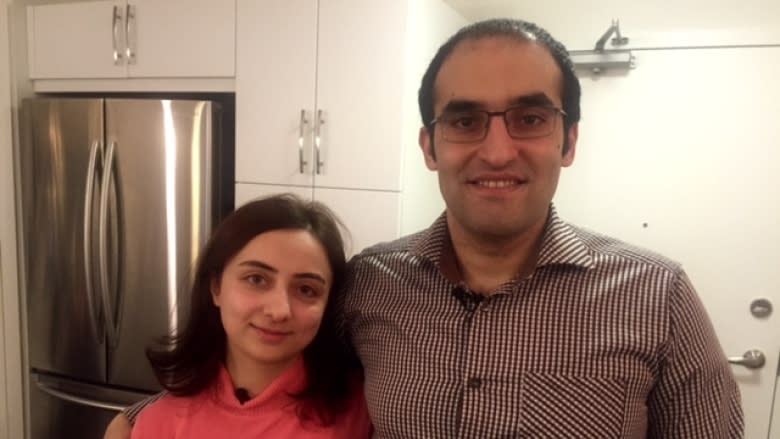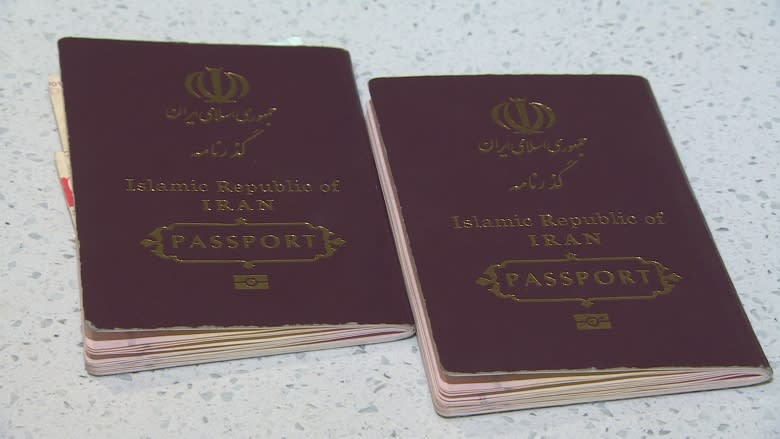Iranian Winnipeggers turned away from flight to U.S. for academic conference
A husband and wife studying at the University of Manitoba in Winnipeg are coming to terms with new restrictions after they say they were turned away from a flight to California on Saturday because of a new executive order from U.S. President Donald Trump.
Elnaz Afsharipour and her husband are from Iran and have lived in Winnipeg for four years on student visas. The couple was headed to an academic conference in San Francisco.
But when they arrived at the airport at 4 a.m. Saturday, less than 24 hours after Trump signed the order, they were unable to check in. After an hour-long wait, they were told it was because they are Iranian.
Trump's order imposes a 90-day ban on entry to the United States for citizens from Iran, Iraq, Libya, Somalia, Sudan, Syria and Yemen — all predominantly Muslim countries. The order, which the L.A. Times has posted in full on its site, also halts the processing of all Syrian refugees for the next 120 days.
'I was shocked'
Prior to their conversation with officials at the airport, the couple said they knew about the ban, but said they didn't think it would affect them — they had spoken to a professor on Friday about it.
Afsharipour said she broke into tears at the airport.
"I really got upset at that time," she said.
"Last week, or during this week, we have been hearing a lot of news about these kind of rules. He's signing something new, he's preparing a draft. But I couldn't — you know, maybe I was not reading the detail of the news, or I maybe couldn't believe."
Afsharipour said the Air Canada representatives who spoke with them at the airport were friendly, but unable to help.
"At first, yes, I was shocked. But when it's like — the time was going and I was feeling that we were missing the flight, and they can't do nothing."
Visas from 2016
Afsharipour said she and her husband had been planning the trip since spring 2016. She is completing her PhD at the U of M and was to present a research paper on photonics at the conference, which she says is one of the field's largest.
She said she'd been working on the paper for months and had to ask a professor to do her presentation for her. She was supposed to present it herself on Monday and says without the presentation, the paper can't be published.
The couple applied for visas for the trip in October 2016 and were approved in November, Afsharipour said. In order to get the visas, they had to fly to Montreal for an interview.
They spent $400 Cdn on their U.S. visas, and had to fly to Montreal for an in-person interview for the application process. All told, Afsharipour's husband, Ramin Soltanzadeh, estimates they spent about $5,000 on arrangements for the trip.
Air Canada released a statement on Saturday alerting travellers of its policy following the ban. According to the statement, any customers who hold passports from the seven countries named in the order who purchased a ticket before Jan. 29 can change their plans free of charge to travel to a different location or at a later date.
Customers can also request a refund or credit towards future travel, the statement reads.
U.S. about-face on dual citizenship
Despite U.S. State Department statements earlier on Saturday that Canadians with dual citizenship with the seven countries in the order would be refused entry, U.S. National Security advisor Michael Flynn said Canadian passport-holders would not be affected by the ban, even if they are dual citizens.
"We have been assured that Canadian citizens travelling on Canadian passport will be dealt with in the usual process," the PMO told CBC News after it says Flynn's Canadian counterpart sought clarification from the U.S.
Following the ban, politicians throughout the country spoke out on the issue, including Prime Minister Justin Trudeau.
Winnipeg Mayor Brian Bowman wasn't available for comment on Saturday, but he addressed the ban in a tweet.
A city spokesman confirmed the tweet was referring to the order.
On Sunday, Manitoba Premier Brian Pallister tweeted that the province will "welcome any and all newcomers whatever the circumstances."
Avoid U.S. travel from now on
Following the ban, Afsharipour and Soltanzadeh said they wouldn't go back to the U.S. on principle, even if the ban was lifted.
"This is the fact, actually, that we have to accept right now," Afsharipour said.
"And, yeah, maybe the next time I would, even if I have the option, I would select the European conferences or the conferences inside the Canada."



